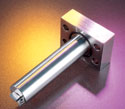For Immediate Release
Perfecting Compressor Refrigerant-Oil Balance
Jun 18, 2019 8:00:00 AM / by Admin posted in PVT, oil analysis, compressor viscosity, refrigerant viscosity
Viscosity Management in Group B, C and D Hazardous Locations
Jul 20, 2017 8:21:00 AM / by Admin posted in 392 sensor, oil analysis, 374 sensor, 372 sensor
Boston—Cambridge viscometers can now be used in Gas Group B hazardous locations in addition to Group C and D hazardous environments. This extension of approvals to Class 1, Division 1, Groups B, C, and D applies to the entire family of in-line 300-series sensors made by Cambridge Viscosity. These are the primary sensors used in refining, exploration, petrochemical and chemical processes, including both standard and high temperature sensors.
The new Gas Group B classification enables these sensors to be used in hazardous locations, which include hydrogen, fuel and combustible process gases containing more than 30% hydrogen by volume or gases of equivalent hazard. Groups C and D include environments that may contain carbon monoxide, ether and hydrogen sulfide, or for Group D, gasoline, acetone, ammonia, benzene, butane, natural gas, propane and other gases of equivalent hazard.
“We are pleased that our 300 sensors have been approved for Gas Group B use. Our sensors have been Group C and D classified for years, but being approved for the more stringent hydrogen environments allows us to provide viscosity management solutions to a whole new segment of customers,” says Cambridge Director of Engineering Daniel Airey.
Cambridge 300 sensors are used in a wide variety of industries for in-line and in-tank applications. Cambridge’s viscometers are well suited to the rigors of harsh environments due to their robust, durable design and construction.

About Cambridge Viscosity
Cambridge Viscosity is the leading supplier of automated viscometers used by oil exploration and refining, coating, chemical and life science companies to optimize product and process performance. Cambridge Viscosity's sensors and viscometer systems conform to ASTM, DIN, JIS and ISO standards, with a range of models designed to meet specific industry and application needs. Certifications include ATEX, CE, and FM. CSA certification is available upon request. Cambridge's global reach provides application engineering support and service wherever and whenever needed. To learn more visit www.cambridgeviscosity.com.
Online Viscometer Ideal for Gas Compressor Lubrication Oil
Jan 30, 2017 10:10:00 AM / by Admin posted in process viscometers, lube oil, 392 sensor, lube oil viscosity, oil analysis, compressor viscosity
FOR IMMEDIATE RELEASE
NTPC India Uses Small Sample Viscometer to Monitor Lube Oils
Jan 26, 2017 2:28:00 PM / by Admin posted in oil viscosity, lube oil viscosity, small sample viscometer, oil analysis, VISCOlab4000, India, Asia Pacific
NTPC, India’s largest thermal power generation company, has purchased a Cambridge Viscosity small sample viscometer, VISCOlab 4000, monitor lubrication oils. NTPC uses large quantities of a variety of oils—lube, fuel, diesel, transformer and gear oil— to operate machinery in their plant. The company will use the laboratory viscometer to verify the quality of inward petroleum material.






